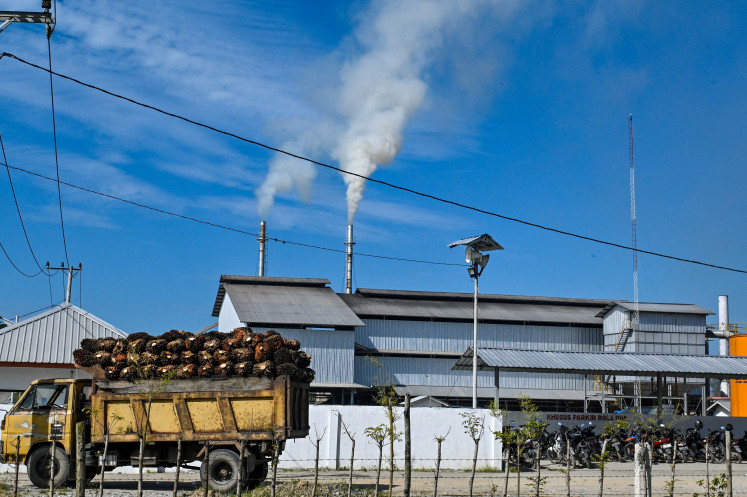Popular Reads
Top Results
Can't find what you're looking for?
View all search resultsPopular Reads
Top Results
Can't find what you're looking for?
View all search resultsSmog raises questions about RI’s commitment to regional haze treaty
The plummeting air quality in Southeast Asia caused by forest fires in parts of Indonesia has raised questions on the effectiveness of an ASEAN agreement to prevent haze pollution and puts the spotlight on Jakarta’s failure to comply with the treaty
Change text size
Gift Premium Articles
to Anyone
T
he plummeting air quality in Southeast Asia caused by forest fires in parts of Indonesia has raised questions on the effectiveness of an ASEAN agreement to prevent haze pollution and puts the spotlight on Jakarta’s failure to comply with the treaty.
The 2002 ASEAN Agreement on Transboundary Haze Pollution (AATHP) was issued to prevent and monitor transboundary haze pollution from land and forest fires, placing the responsibility on concerted national mitigation efforts and intensive regional and international cooperation.
However, the illegal clearing of agricultural land by fire in Sumatra and Kalimantan has caused worsening air quality not only in Indonesia but also in Malaysia, Singapore and most recently the Philippines.
Authorities in Indonesia and Malaysia have closed thousands of schools and Singapore has taken steps to ensure the upcoming Formula One weekend will continue in spite of the smothering haze, according to local reports.
The fires in Indonesia are an annual problem, but this year has seen the worst fires since 2015, when it caused a serious environmental crisis that stoked fears about wildfire outbreaks worldwide exacerbating global warming.
This recurrence raised serious concerns about the effectiveness of the agreement, said Meena Raman, chairperson of Sahabat Alam Malaysia (Friends of the Earth Malaysia).
“ASEAN’s vision of a haze-free region by 2020 now seems like an impossible task,” she said in a statement on Thursday.
Malaysia intends to push for a stronger long-term solution as smog wafts across the region from forest fires in Indonesia, Malaysian Environment Minister Yeo Bee Yin said on Thursday.
“I will have a conference call with the ASEAN secretary-general to raise our views and also express our hope for a more effective mechanism at the ASEAN level for a long-term solution,” she was quoted by Reuters as saying.
Malaysia and Singapore have repeatedly offered support to snuff out the fires, but Indonesia seems adamant on handling the problem on its own.
Indonesia was the last ASEAN country to ratify the agreement in 2014, having signed the pact in 2002 along with other member states.
The agreement was formulated as a response to an environmental crisis that hit Southeast Asia in the late 1990s, which was mainly caused by slash-and-burn land clearance for agricultural purposes in the same regions of Sumatra and Kalimantan.
Kiki Taufik, head of Greenpeace Indonesia’s global forest campaign, said as a country with the largest area of forest and land in ASEAN, Indonesia had failed to comply with the treaty.
“In Article 9 of the AATHP, countries have to take measures to prevent and control activities related to land and forest fires that may lead to transboundary haze pollution through national legal mechanisms,” he told The Jakarta Post on Thursday.
“So the key is law enforcement at the national level using national legal instruments.”
Indonesia’s lead official on ASEAN affairs, Jose Tavares, said on Thursday the ASEAN haze treaty was supposed to strengthen member states’ commitment and cooperation in the region.
“But the reality is that there are still large-scale fires that cause transboundary haze,” he told the Post, emphasizing that implementation of the treaty depends on the domestic regulatory framework of each member state.
“Relevant agencies in Indonesia already have regulations regarding this matter,” he said, deferring further questions on compliance to the Environment and Forestry Ministry.
Separately, the environment ministry’s director of forest fire mitigation, Raffles B. Panjaitan, refused to comment and referred the issue back to the Foreign Ministry.
Ibrahim Almutaqqi, head of the ASEAN Studies Program at Jakarta-based think tank the Habibie Center, said that while the Foreign Ministry had done what it could to get Indonesia to ratify the treaty, it was the responsibility of other government agencies to address the haze.
It has therefore become one of the major challenges Indonesia faces in ensuring compliance with the treaty, he said, with various government agencies showing different levels of commitment.
“It’s very unfortunate what’s happened, as it puts our diplomats in the Foreign Ministry in a very awkward position when meeting their counterparts in the region,” he said.
He said there was not much that the ministry could do to pressure relevant agencies as the instruction needed to come from President Joko "Jokowi" Widodo himself.
“At best, the Foreign Ministry needs to strongly illustrate the reputational damage being done to Indonesia’s image in the region and force the government into action. I’m sure this is being done behind closed doors, but perhaps more needs to be done,” he said.










